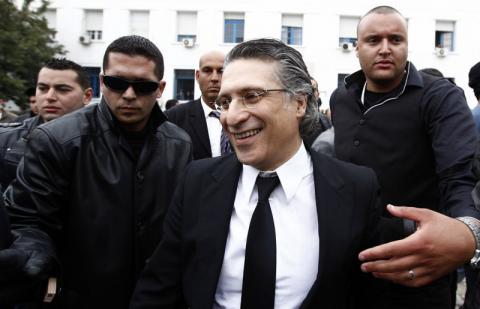Advertisement
Tunisia approves law excluding presidential candidate leading in polls
TUNIS (Reuters) - Tunisia's parliament passed an amendment to its electoral law on Tuesday that would bar businessman Nabil Karoui, owner of a private TV station critical of the government, from running for president in a vote expected later this year.
The amendment says that Tunisia's elections commission must reject candidates who benefit from "charitable associations" or foreign funding during the year before an election.
In April, police stormed the offices of Karoui's Nesma television station and took it off the air over accusations it had breached broadcasting rules, which Nesma called a move to silence its voice criticising the government.
Karoui, who polls show to be in the lead in the presidential campaign, ahead of the prime minister and incumbent president, described parliament's action on Tuesday as "a strong setback to nascent democracy".
"It is a law dedicated to my exclusion from the race after polls revealed that millions of Tunisians intend to vote for me," Karoui told Reuters.
Karoui founded the Khalil Tounes Foundation in 2017 to provide aid to the needy in the economically troubled North African country and the charity garnered widespread publicity thanks to coverage by Nesma.
The police raid in April followed the revocation of the Nesma channel's licence last year by broadcasting regulator HAICA. It fined Nesma for broadcasts the body described as exploiting poor people and promoting Karoui's political agenda.
Nesma rejected the fines and said it did not recognise the rulings by HAICA, which it said were motivated by the broadcaster's criticism of the government.
The government, a coalition of the secular Tahya Tounes party and the moderate Islamist Ennahda party, has denied any responsibility for rulings by the HAICA.
Nesma has since resumed broadcasting without a licence and police to date have taken no further action.
Government spokesman Iyad Dahmani said political parties had been banned from receiving support from charities or foreign funds since 2014, and Tuesday's decision had extended the measure to independents like Karoui "to protect democracy".
Parliamentary elections are expected to be held on Oct. 6 with a presidential vote following on Nov. 17.
Among the declared presidential candidates are Hamadi Jbeli, the former Islamist prime minister, and Karoui.
Tunisia has been hailed as the only democratic success of the Arab Spring uprisings against dictatorship, with a new constitution and free elections in 2011 and 2014.
But political progress has not been matched by economic advances. Unemployment stands at about 15 percent, up from 12 percent in 2010, due to weak growth and low investment.
(Reporting by Tarek Amara; Editing by Mark Heinrich)



















Add new comment